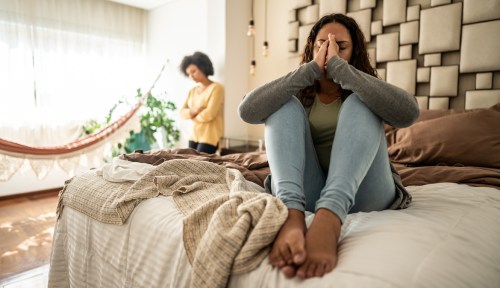Some relationships end in a heated argument that builds up over time, while others are more sudden breakups with no real closure. While breakups can hurt, they often have a clear ending that hopefully pushes everyone involved to move forward with their lives. However, it’s not always clear whether your relationship is ending. You feel stuck in limbo with your partner—you don’t necessarily notice anything earth-shattering that’s “wrong” with the connection, but you also don’t feel as excited or the same energy you may have felt going in. You may notice your enthusiasm or interest waning slowly in the relationship, even if you genuinely care about the person you’re with. If this feels familiar, you may have been (or are currently in) a relationship that is “fizzling out.”
Experts in This Article
psychotherapist at Momentum Health Counseling in New York
a licensed Marriage Family Therapist, and a Relationship Coach
While some people decide to cut and run the second a relationship isn’t exciting, sometimes it’s more complicated. Maybe the relationship has been going on for a few years, and you aren’t sure if the slump is temporary or permanent. Perhaps the relationship is still new, and you don’t want to call things off too quickly in case things can improve. Maybe the relationship is better in your head than in reality, deluding yourself into staying in a connection unsuited for you. Regardless of your situation, it’s important to be familiar with the signs of a relationship fizzling out and what you can do to stop it.
What does it mean when a relationship fizzles out?
“When people talk about their relationship fizzling out, they often refer to the feeling of love and connection that is no longer present,” says Sefora Ray, LMFT, a relationship coach. “They don’t feel as connected, excited, or in love with their partner.” While it’s natural for a relationship to move past the initial “honeymoon phase,” fizzling out goes beyond the average excitement wearing off. There may be specific signs that show the relationship isn’t as important as it used to be to everyone involved.
In some ways, a relationship fizzling out feels like a “non-breakup” breakup, where the relationship seems stale, and neither party is working to make things better again, yet both are still in the relationship. The people involved may be afraid to fully break up because they don’t want to be alone or because they think the relationship will magically fix itself with time. If left unaddressed long enough, this can cause issues for everyone involved. According to a 2014 study1, the fluctuations in a relationship (common in ones that “fizzle out”) significantly affect a person’s well-being and confidence in the relationship.

Signs a relationship is fizzling out
A relationship may fizzle out for a variety of reasons, including some that may seem obvious to you and others that may fly under the radar. According to experts, here are some of the most common reasons a relationship fizzles out.
1. You’re not prioritizing each other
When a relationship fizzles out, one possibility is that other things become more important than the relationship. “[One of] the signs [is] that they’re not wanting to prioritize the other person,” says Ray. While at one point you would likely plan your life around your relationship, now you barely have time for it. Having other priorities is good, but if there is barely any space for your relationship, it could be time to ask yourself why. This failure to prioritize each other could affect each person’s perception of commitment as it relates to the relationship. Two longitudinal studies2 suggested that those who experienced consistent relationship fluctuations (such as doubts or uncertainty) were more likely to experience relationships ending than those who didn’t.
2. Your feelings cool off
The emotions can be intense and overwhelming when you first enter a relationship. Sparks are flying, you get butterflies when you see them, and you blush almost every time you say their name. When those feelings start to fade, it can show a shift in the relationship. “…they’re not feeling that love, feeling those endorphins and oxytocin that they used to feel,” Ray explains. While all relationships generally have a period where the feelings even out, most couples still experience genuine happiness when being with their partner. When a relationship fizzles, even positive emotions can be replaced with apathy.
3. There’s a lack of physical/sexual connection
In relationships that have a highly active sex life or are very physically affectionate, a noticeable drop-off can signal something is off. For example, “They’re not feeling as sexually attracted to their partner,” Ray suggests. This could also be a result of too much stress or of each partner’s sex drives being at different levels once the “high” of a relationship wears off. This sign can indicate a fizzle-out if it was the main thing on which the relationship was hinged. “Sometimes, relationships fizzle out because, at the beginning of the relationship, the relationship was more physical…they didn’t actually have things in common, but the attraction or the physical connection was the thing that created the glue,” Ray states.
4. There’s a lack of interest
When a relationship begins, one underrated aspect is the excitement of getting to know new things about a person and bonding with them, especially over shared interests. When a relationship has been going on for a few years, it can feel as if there isn’t anything new to learn about a partner, which can result in a lack of interest. Since people often change in relationships, a change in interests is extremely common. However, if you both shared a common interest that became foundational to your relationship, and one or both of you are no longer invested in it, this may lead to the relationship fizzling out. “For example, maybe they were into a certain sport, but they don’t play it anymore, or they had a certain hobby that they don’t do together [anymore],” explains Ray. “So, because that was such a glue in their connection with each other, they don’t feel as connected now.”
5. There’s a lack of intention
New couples tend to want to spend all their time together and flirt with each other constantly. However, when a relationship starts to fizzle out, people in the relationship may become less intentional in romancing or spending time with their partners. “When people are early in a relationship, they often flirt with each other. They send cute messages. They might flatter each other by saying, “Oh, your eyes look so beautiful,” and a lot of those appreciations, sweet things, and gestures often create oxytocin,” Ray explains. Why is this important? “They (oxytocin chemicals) create co-regulatory experiences and endorphins.” In other words, these types of actions and gestures bring couples closer. When these are lacking, people in a relationship drift apart, even if they don’t fully realize it.
6. Fights and arguments are becoming more frequent
It’s not uncommon for couples to argue—even the healthiest relationships are dotted with a few arguments here and there. However, when a relationship is fizzling out, people can find themselves bickering or picking fights more often, even for insignificant reasons. “They fight a lot, they might bicker [more], or feel like they don’t have things in common that they used to or that they don’t like the same things,” says Ray. Addressing important issues in a relationship is a good thing, but when the situation turns into getting angry or annoyed every time they do something, it can signal that you’re looking for reasons to exit the relationship but may not want to be the one to call it off. One or both parties may try to engage in frustrating behaviors, such as bickering, to push the other person to end things so they don’t have to. If neither person pulls the plug, you can be stuck in a pretty miserable limbo.
7. There’s a lack of communication
Good communication is considered one of the most important qualities in any healthy relationship. When a relationship is fizzling out, a lack of communication could be a sign. Rather than talking things out when an issue arises or sharing things about your day or how you’re feeling, you could notice that you and your partner aren’t engaging with each other much. It’s even more of a sign it doesn’t bother you. While there may be periods when one or both of you are stressed out, making communication difficult, the lack of effort to communicate well can say something about the state of your relationship that needs work addressing.

What to do if a relationship is fizzling out
If you notice concerning factors in your relationship, it’s time to take action. Below are ways to determine how to stop a relationship from fizzling out.
1. Identify the areas you’re not connecting in
When you recognize that your relationship is fizzling due to a lack of connection, pinpointing the areas you’re not connecting is an important first step. It’s one thing to feel disconnected, but another to understand why. “A prerequisite for effective communication is understanding and acknowledging how you feel about the disconnection,” says Anna Glaser, LMHC, LPC, MA, EdM, psychotherapist at Momentum Health Counseling in New York. For example, if your relationship doesn’t have as much sex or quality time as you would like, it’s good to be aware of the issue and how it makes you feel. “Another recommendation would be to identify key patterns or dynamics that may contribute to the feelings of disconnection or relational decline. Ask yourself, is it an external stressor, an avoidance pattern, fear of commitment, or communication challenges that are prompting feeling detached?” says Glaser.
2. Communicate
Again, good communication is essential for any healthy relationship, which means you and your partner must be able to communicate where things fall short. “The most helpful way to handle a relationship fizzling out is to communicate your thoughts and feelings effectively to your partner,” Glaser advises. This can be intimidating if you are afraid of causing a fight or you feel your partner(s) isn’t interested in discussing things. However, it’s important to bring these concerns up and talk through them with your partner(s) if you want to save the relationship.
3. Be more intentional with the relationship
It’s easy to fall into the trap of “going through the motions” when you’ve been dating for a while. This can result in neither person having their needs or desires of met in the relationship. If your relationship seems to be fizzling out, it’s time to get more intentional. This can look like planning specific dates, setting aside time to talk about your days, and trying to include thoughtful gestures back into your everyday routine. “You can flirt with each other. You can notice that you want to appreciate each other more than criticizing, doing behaviors where you’re looking into each other’s eyes, cuddling with each other, and creating contact. Sometimes, adding some of those things back in brings more of that oxytocin back. It brings connection,” says Ray.
“[If] you don’t want the same things in a relationship, or you don’t want the same amount of time together, quality time, and connection, then it may not be worth it to put a lot of energy into trying to reestablish the relationship and make it better.” —Sefora Ray, LMFT, a relationship coach
4. Be open to new things
Sometimes, a relationship can benefit from trying new things together, especially if one or both parties have changed over time. Suggesting new experiences you’ve both wanted to try or being open-minded to new things can help introduce some excitement into the relationship. “When there are new activities or things that you’ve experienced for the first time, it creates excitement, energy, and different biological responses. So, sometimes doing something new with your partner—like going to a new place, trying something new, or a new activity—can bring back that energy,” says Ray.
5. Be honest with yourself (and your partner) about what you want
While it may seem obvious, being honest and transparent about your feelings is essential to help your relationship. Rather than brushing things under the rug or pretending you’re fine when you’re not, being honest about what you need and how you feel is necessary to work through issues that led to the relationship fizzling out in the first place. Sometimes, honesty may mean you don’t want to revive the relationship, which is important to acknowledge. You may realize you aren’t compatible or have different goals that rekindling the relationship won’t fix. “[If] you don’t want the same things in a relationship, or you don’t want the same amount of time together, quality time, and connection, then it may not be worth it to put a lot of energy into trying to reestablish the relationship and make it better,” says Ray.
You may decide that you want to fix things, whether due to a larger commitment you made to each other (such as marriage or having children together) or because you genuinely want to salvage the relationship. Being honest about whether you think the relationship is worth saving can make a huge difference without wasting anyone’s time.

What to do after a relationship fizzles out
Once a relationship has fizzled out, the best course of action may be to move on and take some time to explore your wants. If you’re unsure how to go about this, experts shared a few ways to move forward after a relationship fizzles out.
Decide if you want to salvage the relationship
If your relationship has fizzled out, the first step is to decide whether you want to try to repair it or end it. If you’re struggling with which way to go, Glaser and Ray recommend asking yourself questions to help clarify whether you want to work on the relationship.
Check in with yourself
A few examples of questions to ask yourself include:
- Do we have the same values?
- Do we have the same commitments to what we want in a relationship?
- Am I still attracted to this person?
- Do I like who they are?
- Is there a larger commitment (such as marriage or children)?
- How do I feel about this relationship’s decline?
- Is the relationship bringing me meaning and fulfillment?
Seek out couple’s therapy together
If you decide to try and work on the relationship, you must be both on the same page and approach this change together. “Seeing a couple’s therapist can be helpful, especially if you both are committed to working on things,” says Ray. However, both people have to want to improve things; if only one person puts in the effort, the relationship is unlikely to turn around. “One of the best ways to think about this is to ask yourself: ‘If you had a million-dollar company that was tanking, how much attention and energy would you put into it to save the company?’ Probably a lot,” says Ray. “For some reason, when couples are tanking, they don’t carve out the time to make the interventions that they need.”
Work on healing yourself
Whether you choose to continue the relationship or move on alone, Glaser recommends working on healing yourself. “After a relationship fizzles out, focusing on healing, renewal, and self-care can help process the aftermath. Healing involves an internal reconnection with yourself and your needs, along with a commitment to external action and intentionality. It is a time for both introspection and connection with your community,” says Glaser. Especially if your relationship ends, it’s important to get in touch with yourself and your needs as you adjust to life without the relationship, rather than spend all your time focusing on the breakup.
Let yourself grieve the connection
“If the relationship is over, then there is a lot to learn about it, there is grieving to do, and ways to move on,” says Ray. There is an assumption that a relationship slowly fizzling out doesn’t hurt or have the same emotional impact as a relationship that ended dramatically or abruptly, but heartbreak is devastating regardless of how it happens. Sometimes, healing can feel even more challenging if the relationship’s ending wasn’t anyone’s fault, just a lack of compatibility. Even if the relationship ends calmly or gradually, grieving the relationship is still worth exploring. The longer someone is in your life, the more heavily you may feel the absence of that relationship, especially if you were living together. Giving yourself time to feel your emotions and grieve them fully, such as talking to trusted confidantes/a therapist, journaling, or crying, can help you process the breakup.
Look for the positives/learning experiences
While it may feel counterintuitive to “look for the positives” when a relationship ends, doing so can be helpful moving forward. Glaser says if you opt to end the relationship, it’s worth exploring if it’s possible to end things in a healthy way. “In relationships, we seldom get the opportunity for closure and a true goodbye. A positive aspect of a relationship fizzling out is that it offers the option for a conclusive ending.” While it may not lessen the pain of a breakup, it can hopefully let you avoid any additional unnecessary pain on both sides and potentially let you end things amicably.
Is it normal for a relationship to fizzle out?
Relationships can have ups and downs, so is this just a normal part of the dating process? “The term “fizzling out” itself is abstract and highlights how this process is filled with relational ambiguity, making it difficult to identify and understand,” says Glaser. According to Glaser, a relationship in its earlier stages or a casual relationship fizzling out isn’t uncommon. “The “fizzling out” period typically happens in early dating experiences, after a few dates, when individuals begin to assess whether their date is a suitable match. However, it is important to recognize that relationships fizzling out is a normal part of dating and can even be a helpful way to determine early dating compatibility,” Glaser says.
“In the modern age, when most people are meeting on dating apps rather than through mutual friends or shared interests, this fizzling, or weed out period, may be even more common.” —
It’s important to note that the current ways we meet and date, notably online, seem to have a higher rate of fizzle-out potential. “In the modern age, when most people are meeting on dating apps rather than through mutual friends or shared interests, this fizzling, or weed out period, may be even more common due to the increased likelihood of meeting individuals we otherwise likely would not have encountered without the aid of technology,” Glaser points out.
So what about in longer-term relationships—is fizzling out just as common in a serious relationship versus a casual one? “Yes and no,” says Ray. “It’s very common for the early new relationship energy to change. You become more used to each other, not as exciting, and small things that annoy you might be bigger now.” She notes that typically, what causes a long-term relationship to fade is people not investing as much in them as they did early on. “Often times relationships fizzle because people are not tending to them enough, or because they don’t have enough “glue” connecting them.” What does relationship glue look like? “The glue could be many things: common interests, values, wanting the same things out of life. Or it could be that they are not managing stress well together, and instead of being a team, they are attacking each other and acting out their stress on each other.” If a couple isn’t actively working to keep a relationship alive, that relationship is much more likely to fizzle out over time.
It may also be more common for a relationship to fizzle out due to specific circumstances. For example, a long-distance relationship fizzling out is more likely due to the lack of opportunities to connect the way you would in an in-person relationship, such as physical touch.
Final thoughts on a relationship fizzling out
Acknowledging a relationship has fizzled out—especially if it results in a breakup—can be difficult. It may feel impossible to see any positives in the situation, but there are some takeaways to look for. “This period following a relationship fizzling out can be a call to action to refocus on yourself and continue the effort to strengthen your relationship with yourself,” says Glaser. “It may also serve as a reminder to prioritize your relational goals. Additionally, it often prompts individuals to seek support and invest in their mental and physical health.”
A relationship fizzling out can help you determine your wants and needs in your future relationships so that you don’t go through the same experience. You may even walk out of the relationship with a clearer picture of your ideal partner and any relationship habits you need to work on yourself. When all is said and done, the end of one relationship can set you up for the start of a newer, healthier relationship with more long-term potential.
- Whitton, Sarah W et al. “Fluctuation in Relationship Quality Over Time and Individual Well-Being: Main, Mediated, and Moderated Effects.” Personality & social psychology bulletin vol. 40,7 (2014): 858-871. doi:10.1177/0146167214528988↩︎
- Arriaga, Ximena B et al. “Relationship perceptions and persistence: do fluctuations in perceived partner commitment undermine dating relationships?.” Journal of personality and social psychology vol. 91,6 (2006): 1045-65. doi:10.1037/0022-3514.91.6.1045↩︎
Sign Up for Our Daily Newsletter
Get all the latest in wellness, trends, food, fitness, beauty, and more delivered right to your inbox.
Got it, you've been added to our email list.











